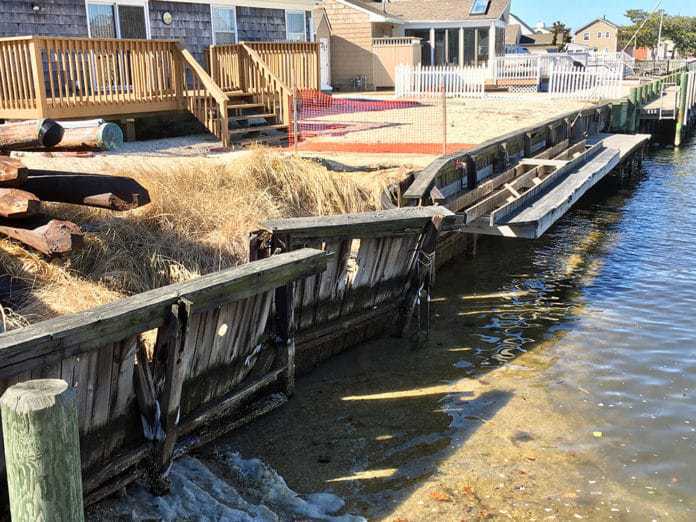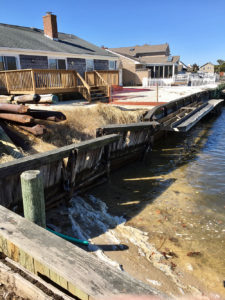
BRICK – The township recently implemented a new program to help people who are living next to abandoned properties that include failing bulkheads.
“This is more than an eyesore,” said Council President Art Halloran. “These bulkheads undermine the entire system and create significant hardship for neighboring properties.”
A lien program is in place that is similar to the program in place for property maintenance issues whereby the township Department of Public Works goes out, cleans up and makes basic repairs to secure private structures and minimize the impact these properties have on the rest of the neighborhood, he said.

Since the township does not have the equipment or capability to repair bulkheads, the administration secured prices for a list of the bulkheads considered the most vulnerable. The lowest bidder recently completed work on the bulkhead of 301 Dory Lane.
“The council approved facilitating the tax lien for that work, and we fully expect to receive the cost back through this lien, which will be listed as the primary lien holder,” Halloran said.
Of the 164 vacant and abandoned properties in town, six have failing bulkheads. The governing body is considering retaining a firm who specializes in the processes to address these properties.
Borgers Saunders Taylor & Associates (BSTA) of Glen Ridge provides New Jersey towns and cities with Vacant and Abandoned Property Program services, ranging from consulting/training sessions to full Vacant and Abandoned Properties development and implementation.
In 2014, the state passed a statute that allows municipalities to levy fines against foreclosing creditors that do not keep abandoned houses in good repair.
“The reason the council is considering this is because this is a relatively new statute in the state,” said Township Attorney Kevin Starkey at the March 7 council meeting.
“There are aspects of this that no other town in the state has done; for example there is a special tax lien that can be done to try to address this, so there are a lot of things that are very new and very different that people here have not experienced, but we have a problem that needs to be addressed,” he said.
BSTA would come in and help the township identify creditors who have not registered a foreclosed mortgage. They recommend that the township appoint an existing township official or hire someone to new to be a point person, Starkey said.

“The payment to these people is not coming from the taxpayers and not coming out of the budget,” Starkey explained. “Their payment is a percentage of the fines that are going to be paid by the banks and the mortgage holders that are not registering, and penalties paid through code enforcement process when they don’t maintain the property.”
BSTA would train and educate township code enforcement officers how to identify properties that can be fined, recommend fines, and assist them through the court process.
The firm could help the township clean up abandoned properties and generate revenue, and take a percentage of the revenue as their fee, he said.
“That tells me that this firm has a lot of confidence that they can do the right thing,” Starkey said. “I think this is a good proposal, and on top of that it’s a one-year contract so this mayor and council at the end of the year have the opportunity to sit back and say ‘Is this working for us?’ And I hope it does, but if it doesn’t, it’s a one-year process where we’re going to get township employees educated, people trained, and get vacant properties at least part of the way cleaned up so I think it’s a worthwhile thing to look at now.”
Township Business Administrator Joanne Bergin said township code enforcement officers testify in code court that they try to locate creditors by sending letters but the letters come back.
“Nobody is responding, nobody shows up in court – these creditors are very good at layering and layering several different machinations of who owns what, so their hardest challenge is finding who should be cited and who’s responsible, because they’ve set up this system so that it’s like a needle in a haystack,” she said.
The judge has no choice but to tell the code enforcement officials to keep searching because without somebody to hold accountable they could not issue or impose fines, Bergin said.
“If this company is able to connect with the [abandoned properties] on this list that our guys are not able to do, then it’s worth the effort,” she said.
“It’s not through the lack of trying, it’s through the lack of understanding how this law works and how they can get through the system of finding the responsible person because they have been building a firewall system that most towns just can’t penetrate,” Bergin said.

Council President Art Halloran said the council would hold off on voting for the contract so the council could have more time to review.
“This is a very important initiative and there were questions raised by members of the governing body as well as members of the public that led us to decide to hold off,” he said after the meeting.
Addressing the township’s number of abandoned and vacant properties is a very important initiative for the governing body, and it’s relatively new territory in terms of how a municipality can take a proactive role in taking responsibility for private property, he said.
“The township is looking to create and implement a vacant and abandoned property program that will give our code officials the tools they need to be effective…and a multi-faceted program is needed to ensure compliance,” Halloran said
The council’s Land Use Committee would discuss the contract in more detail at its April meeting and bring a recommendation back to the full council, he said.
The next council meeting will be on Tuesday, April 11 at 7:00 p.m.






